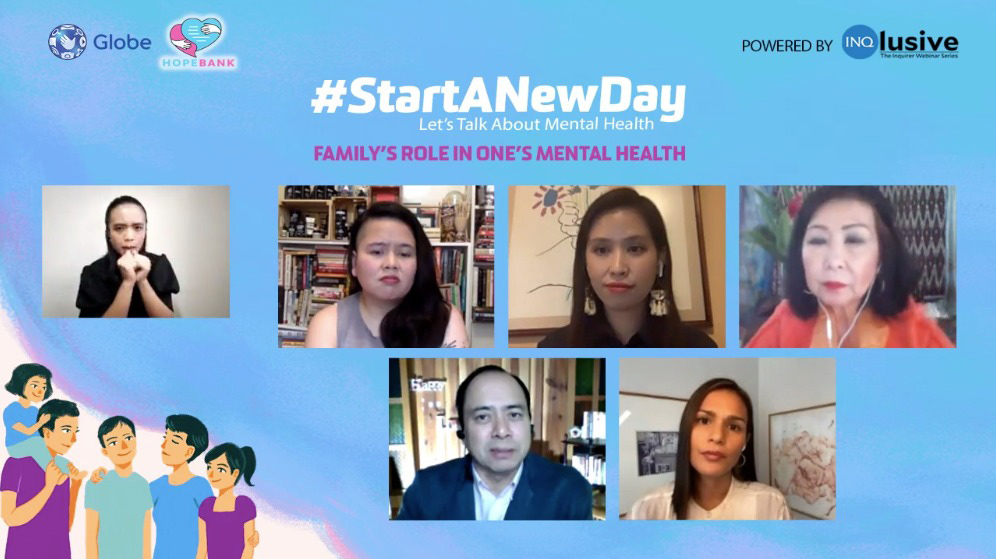While conversations on mental health are becoming more common today, there remains a lot of misconceptions and outdated beliefs that we need to change. It’s important to continue learning and reaching out to both experts and our peers and family so we can better understand these conditions and how to deal with them.
Globe and Inquirer’s webinar series, #StartANewDay is just one avenue for such learning. The most recent leg on Family’s Role in One’s Mental Health, held last Oct. 2, featured several of these misconceptions, that the webinar panel, made up of mental health advocates and experts, debunked.
Do I need to have a mental health problem to see a doctor?
Many people still assume that going to see a mental health expert automatically means that there’s something wrong with you. University of the Philippines PsycServ’s clinical supervisor Dr. Anna Tuazon says that’s not the case. Seeing a doctor earlier is always better, she says. “I’d rather they go to me before anything happens. You don’t need a disorder or a diagnosis to get help.”
She adds that seeing a professional early can also help in assuring you about any mental health concerns you may be experiencing. Because, according to Dr. Tuazon, consultations often take the form of regular conversations, doctors can help you sort out these concerns, put a label to the problems and possibly even help you in coming up with ideas to solve them.
“As professionals we are not invested in finding a problem,” she says, adding that they’d even be more relieved to tell you you are okay.
Can I pray my mental health condition away?
“A common misconception is that it’s a spiritual crisis,” mental health advocate and businessman Manong Ari Verzosa shares. “I’m not anti-Catholic or anti-religion. I’m actually very traditional. So when my friends tell me, ‘Ari, dasal ka lang,’ I think, how much more do I have to pray?”
With a large swath of Catholics in the country, it’s understandable why many suggest turning to faith to cope with problems. However, it’s dangerous to say that people have mental health problems because they aren’t spiritual enough.
Manong Ari suggests changing how we approach the discussion of mental health and faith. Instead of blaming the problems on a person’s alleged lack of faith, offer them your prayers. “Mas okay pa ’yung, ‘Ari, make sure you get proper help and medication, and I will pray for you,’” he says.
Being more aware and educating yourself about matters of mental health also helps in preventing this kind of wrong messaging about mental health and those experiencing problems. Natasha Goulbourn Foundation and Hopeline suicide crisis hotline founder Jean Goulbourn shares, “Where did I go wrong? It’s not being educated. It’s not knowing her plans that she planned to take her life… I couldn’t use those words—suicide, magpapakamatay. I thought, if she does this, she’s going to go to hell. That’s how wrong my thinking was.”

Are mental health issues genetic?
While there are some studies that suggest there is a possibility of “inheriting” mental health conditions such as bipolar disorder, major depression and schizophrenia, there are more factors that influence how we develop these issues beyond our genes.
For multi-awarded actress and mental health advocate Iza Calzado, it depends on both our genes and our lifestyle. “My personal belief is that… we cannot escape our genes, however, like Manong Ari, I’m a firm believer in epigenetics… Your lifestyle affects your genetic expression.
“Ayoko magpatali o magpatalo sa predetermined thing. It’s not just mental health we’re talking about, but also cancer, diabetes, any chronic disease.”
Dr. Tuazon seconds this, saying that mental health conditions develop indeed by a mix of genes and epigenetics. “We are no longer tied to the genes that we inherited. It’s a lot more modifiable than we think. Learning and experience changes the switches—it determines which genes get switched on or off,” she says.
For more insights on the topic, the Oct. 2 webinar can be viewed here.
Header image courtesy of Priscilla Du Preez on Unsplash
Get more stories like this by subscribing to our weekly newsletter here.
Read more:
Taking care of your family’s mental health shouldn’t be complicated. Just remember these 5 tips
It’s time we talked about our educators’ mental health
How to take care of your mental health, according to WHO and CDC
Writer: PAULINE MIRANDA
IN PARTNERSHIP WITH GLOBE




